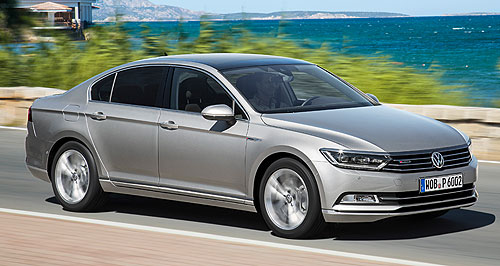Future models - Volkswagen - PassatVolkswagen Passat engineered to challenge MercedesReal steel: Volkswagen nearly doubled the use of hot-formed high-tensile steel for its new Passat mid-sizer. New-gen VW Passat benchmarked against the best to ensure more refined ride13 Oct 2014 By BYRON MATHIOUDAKIS in SARDINIA, ITALY THE eighth-generation Volkswagen Passat was benchmarked against Mercedes-Benz for comfort and BMW for handling, and the German brand says it was engineered with no limits in order to be the best mid-sizer in the world. Still 12 months from introduction in Australia, the German-built mid-size sedan and wagon will be priced similarly to the outgoing version, which starts from $38,990, plus on-road costs. With design and development commencing in Germany four years ago, testing for the new Passat was carried out in Europe and North America. The goal was to make the newcomer more fun to drive than the previous-generation model – which dates back to the B6 of 2005 although a significant re-skin occurred in late 2010 – as well as more comfortable and refined. While on paper it looks similar to the old model under the skin, every component of the B8-series’ fresh MQB-B architecture has been significantly altered or completely changed, from nearly doubling the amount of hot-formed high-tensile steel to a substantial increase in the aluminium in the front suspension and associated areas. Along with a longer wheelbase and shorter overhangs, this led to a re-proportioning of the front to rear weight balance by a factor of two per cent towards neutrality, altering the feel of the car. The upshot is not just a drop in weight – up to 85kg depending on the variant – but also a big boost in body rigidity, which was deemed vital in increasing the Passat’s dynamic capabilities. All areas of suspension and steering geometry were revised, with an emphasis of improving the car’s handling agility to feel controlled and linear even at high speed. This involved the raising of the B8’s roll centre from 40mm to 70mm, which presented challenges as far as high-speed stability was concerned. The engineering team overcame these by paying special attention to the Passat’s aerodynamics, steering tuning and rear axle kinematics. Furthermore, lateral movements of the trailing arms have been minimised by the use of special bushes and dampers, promoting greater driver control, reduced noise intrusion and better bump absorption. Better subframe isolation also helps. The body-in-white itself is 22kg lighter than before yet much stiffer, with the wagon’s stiffness jumping 20 per cent and the sedan’s five per cent over the outgoing model. Wheel sizes vary from 17- to 19-inches in diameter. For the first time, Passat gains a variable ratio steering system on some models, with turns lock-to-lock falling from 2.75 to 2.1. For refinement’s sake, the exterior mirrors are now mounted plinth-style on the door rather than at the trailing edge of the glass, dramatically cutting the amount of airflow-related noise heard inside the car. Better and stronger metals mean the A-pillars are 17 per cent thinner than before to improve forward vision and allow for an airier feeling to the cabin. The same metals around the boot area means the lid’s hinges are U-shaped to ensure they don't impede on cargo capacity, as well as requiring fewer body holes, which in turn helps quell noise paths. Finally, the Passat may be based on the same MQB platform as its Golf sibling, but the two share few parts aside from some drivetrains, steel panels in the floor and the electrical system. Indeed, the bigger car’s front subframes and front and rear suspension knuckles are made of aluminium, while the Golfs are steel. Volkswagen AG head of chassis tuning Karsten Schebsdat said there were no limits placed on the engineering team in building a quality product, and that there was a strong focus on making the new Passat more fun to drive. “We wanted to increase the emotional connection for the driver,” Mr Schebsdat said – a chassis engineer of distinction, who worked on the Mk1 Ford Focus, Mk5 Golf, and several Porsches including the 997 GT2 and GT3, before returning to Volkswagen to help tune the Passat.  Read more9th of October 2014  Next Volkswagen Passat pushes into premiumPassat will still take on Mondeo, but VW has Mercedes-Benz C-Class in its sights tooAll future models Alfa Romeo Alfa Romeo Abarth Abarth Audi Audi Aston Martin Aston Martin BMW BMW Bentley Bentley Chrysler Chrysler Chevrolet Chevrolet Dodge Dodge Citroen Citroen Ferrari Ferrari DS DS Ford Ford Fiat Fiat FPV FPV Foton Foton Haval Haval Great Wall Great Wall Honda Honda Holden Holden Hyundai Hyundai HSV HSV Isuzu Isuzu Infiniti Infiniti Jeep Jeep Jaguar Jaguar Lamborghini Lamborghini Kia Kia Lexus Lexus Land Rover Land Rover Mazda Mazda Maserati Maserati Mercedes-Benz Mercedes-Benz McLaren McLaren Mini Mini Nissan Nissan Mitsubishi Mitsubishi Peugeot Peugeot Opel Opel Proton Proton Porsche Porsche Renault Renault Ram Ram Saab Saab Rolls-Royce Rolls-Royce Smart Smart Skoda Skoda Subaru Subaru SsangYong SsangYong Tesla Tesla Suzuki Suzuki Toyota Toyota Volvo VolvoPassat pricing
Motor industry news |
Click to shareVolkswagen modelsResearch Volkswagen All future models Alfa Romeo Alfa Romeo Abarth Abarth Audi Audi Aston Martin Aston Martin BMW BMW Bentley Bentley Chrysler Chrysler Chevrolet Chevrolet Dodge Dodge Citroen Citroen Ferrari Ferrari DS DS Ford Ford Fiat Fiat FPV FPV Foton Foton Haval Haval Great Wall Great Wall Honda Honda Holden Holden Hyundai Hyundai HSV HSV Isuzu Isuzu Infiniti Infiniti Jeep Jeep Jaguar Jaguar Lamborghini Lamborghini Kia Kia Lexus Lexus Land Rover Land Rover Mazda Mazda Maserati Maserati Mercedes-Benz Mercedes-Benz McLaren McLaren Mini Mini Nissan Nissan Mitsubishi Mitsubishi Peugeot Peugeot Opel Opel Proton Proton Porsche Porsche Renault Renault Ram Ram Saab Saab Rolls-Royce Rolls-Royce Smart Smart Skoda Skoda Subaru Subaru SsangYong SsangYong Tesla Tesla Suzuki Suzuki Toyota Toyota Volvo VolvoPassat pricing
Motor industry news |









































Facebook Twitter Instagram